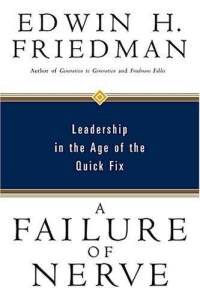Ed Friedman, A Failure of Nerve: Leadership in the Age of the Quick Fix. Seabury Press, 2007.
Referenced in: Leadership and Emotional Systems. Self-Differentiation
LifeandLeadership.com Summary
This was written ten years after Friedman’s death by permission of his family trust and through the editorial work of Margaret W. (Peggy) Treadwell and Edward W. (Ted) Beal. It applies the societal regression theory of Murray Bowen to the practice of leadership in the current setting. He describes the tendency of leaders in anxious times to adapt to immaturity, showing “a failure of nerve.” Friedman contrasts this with the quantum leap that occurred around the year 1500. At that time, a complete reorientation to reality resulted from the nerve of the great navigators who led the way for Western civilization out of the imaginative gridlock of the medieval period. He refers to leaders such as Columbus, Michelangelo, DaVinci, Drake, Shakespeare, and Cervantes. He argues these leaders shared five characteristics:
- A capacity to get outside the emotional climate of the day
- A willingness to be exposed and vulnerable
- Persistence in the face of resistance and downright rejection
- Stamina in the face of sabotage along the way
- A perception (by others) as being “headstrong” and “ruthless”
He suggests the climate of contemporary America has become so chronically anxious that we are in an emotional regression that is toxic to well-defined leadership. This kind of emotional climate can only be dissipated by leaders with the capacity to function well when the world about them is disoriented and stuck in a certain way of thinking. He presents the need for clarity and decisiveness in a civilization that inhibits the development of leaders with clarity and decisiveness. He calls for leaders who question the widespread triumphing of data over maturity, technique over stamina, and empathy over personal responsibility. He argues for an emphasis on strength, not pathology; on challenge, not comfort; on self-differentiation, not herding for togetherness. Such leadership is not, therefore, for those who prefer peace to progress. It is not for those who mistake another’s well-defined stand for coercion. It is not for those who fail to see how in any family or institution a perpetual concern for consensus leverages power to the extremists. And it is not for those who lack the nerve to venture out of the calm eye of good feelings and togetherness and weather the storm of protest that inevitably surrounds a leader’s self-definition.
Like other authors in this field, Friedman uses the label of the well-differentiated leader. By this he means someone who has clarity about his or her own life goals, and is therefore less likely to become lost in the anxious emotional processes swirling about. someone who can separate while still remaining connected, and therefore can maintain a modifying, non-anxious, and sometimes challenging presence.
Two other books by Friedman that are not limited to leadership in emotional systems yet are still popular among his readers include Friedman’s Fables (Guilford, 1990) and The Myth of Shiksa and Other Essays (Seabury Press, 2008).
About the Author
Edwin H. Friedman was an ordained rabbi and practicing family therapist. His ground-breaking volume Generation to Generation, which exposed the connections between emotional process at home and at work in religious, educational, therapeutic, and business systems, has become a modern classic. In great demand as a consultant and public speaker throughout the country, he lived in Washington DC. He died in 1996.
***For additional information on this resource, including reviews, click the bookstore links. Check the reference at page top or the links below for resource guides on related topics.***
Related Areas
See Other Resources on Leadership:
See Resources on Over 100 Areas of Ministry Leadership:


